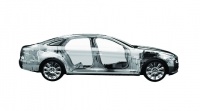
Engineers led by Richard Dashwood and Gordon Smith at Warwick University are currently developing methods for producing panels made of such hybrid materials, using standard polymer injection-moulding technology.
Smith said that the challenge will be making sure the polymer remains adhered to the metal. This may be accomplished, he said, with micro-scale mechanical interlocking techniques.
According to Smith, the micro-porosity in a metal surface provides a convenient array of microscopic holes that can be filled with resins. This, he said, presents a surface for a polymer to bond with.
One of the immediate objectives of developing hybrid panels, Smith said, will be to reduce their weight by 20 per cent or more compared with monolithic steel parts.
Smith’s group has estimated that if this technology was adopted on a single component – such as the bonnet – with 250,000 units made annually, it would save around 1.5 million kilograms of carbon dioxide a year.
The combination of polymers and metals could also lead to a host of new product concepts for the automotive industry.
Smith imagined panels built with smart polymers that could fix their own dents. The car could fix these dents through autonomous methods that involve applying heat so the plastic returns to its original state.
Other ideas, he said, could include plastic panels that stiffen up in response to an imminent impact. Smith said this is plausible, as sensors in some modern cars can already sense the proximity of people and objects.
’The sensors could trigger an electrical response and that could send a pulse into the plastic that gives it a different physical nature,’ he explained.
Dashwood and Smith’s research exists under a larger university umbrella programme sponsored by Jaguar Land Rover and Tata.
Smith believes his vision for smart car panels could be realised quickly because the materials involved are well known.
’We know the materials exist, it is how we can manufacture them and control them,’ he said. ’I am looking at commercialisation in two to three years.’










Water Sector Talent Exodus Could Cripple The Sector
Well let´s do a little experiment. My last (10.4.25) half-yearly water/waste water bill from Severn Trent was £98.29. How much does not-for-profit Dŵr...